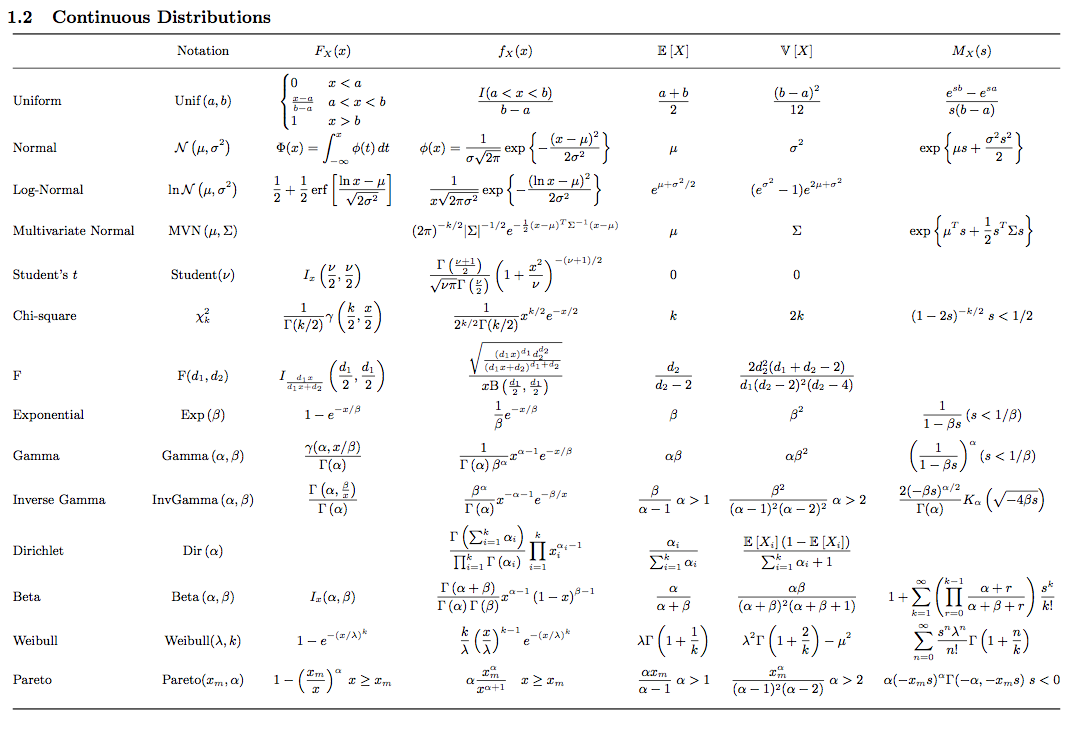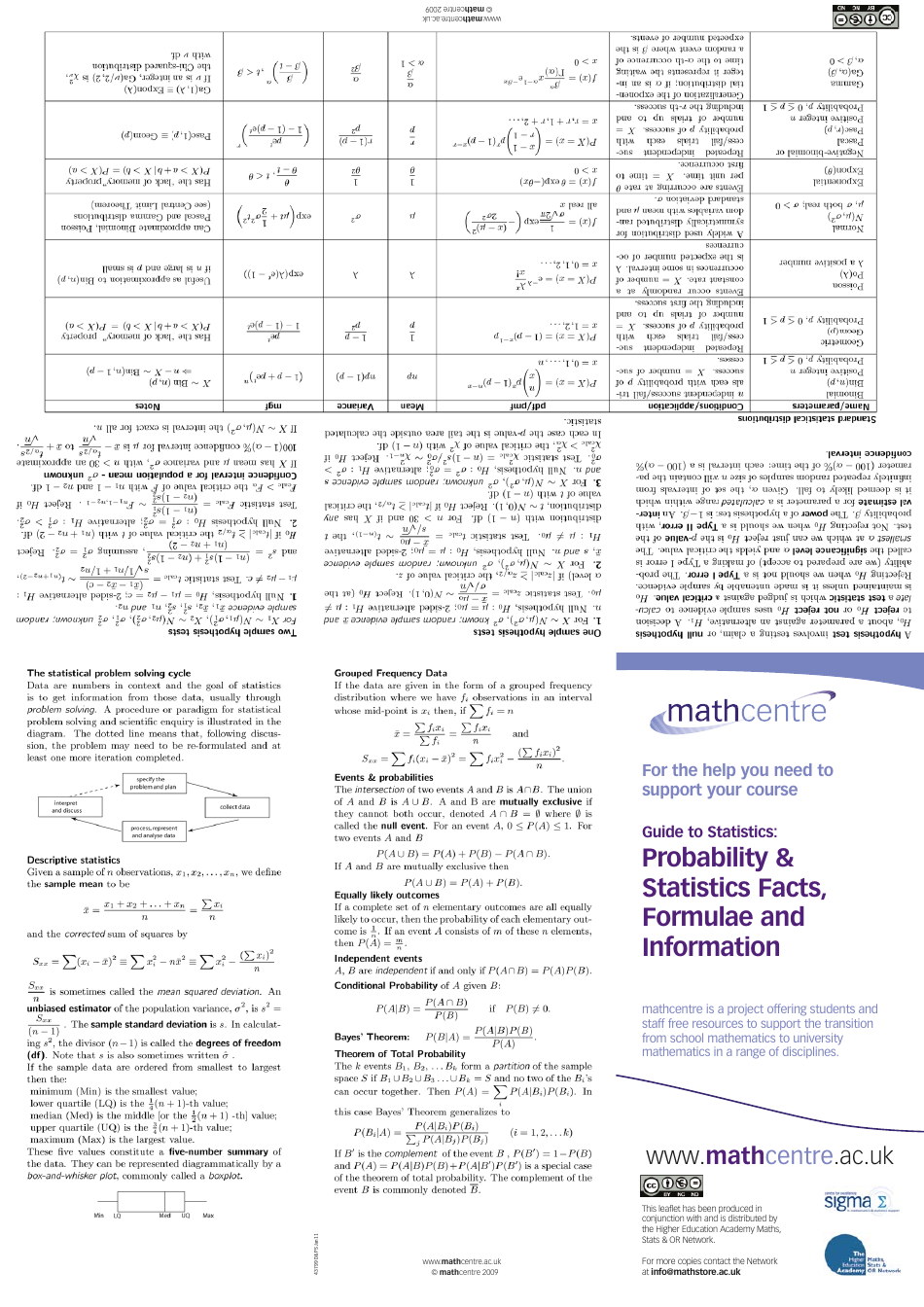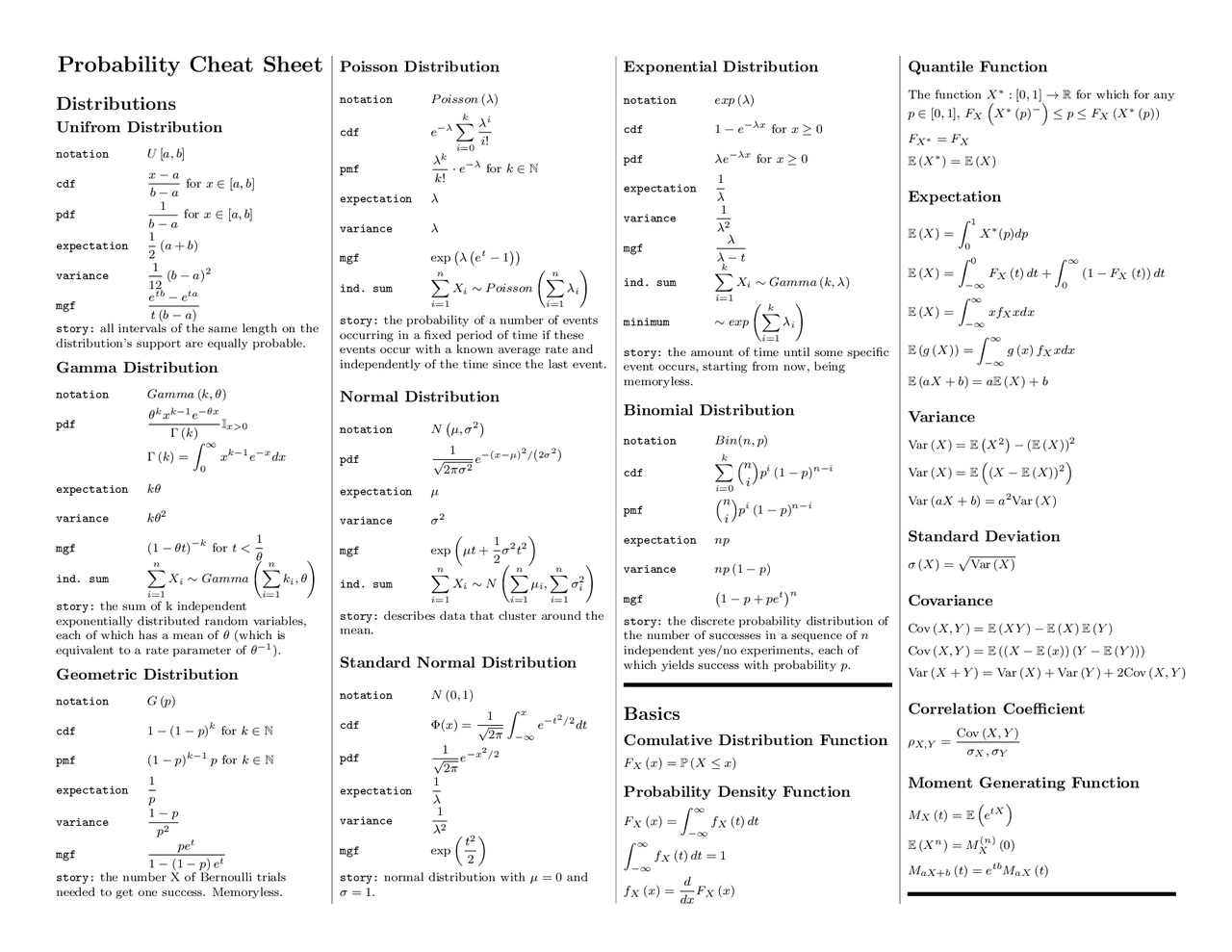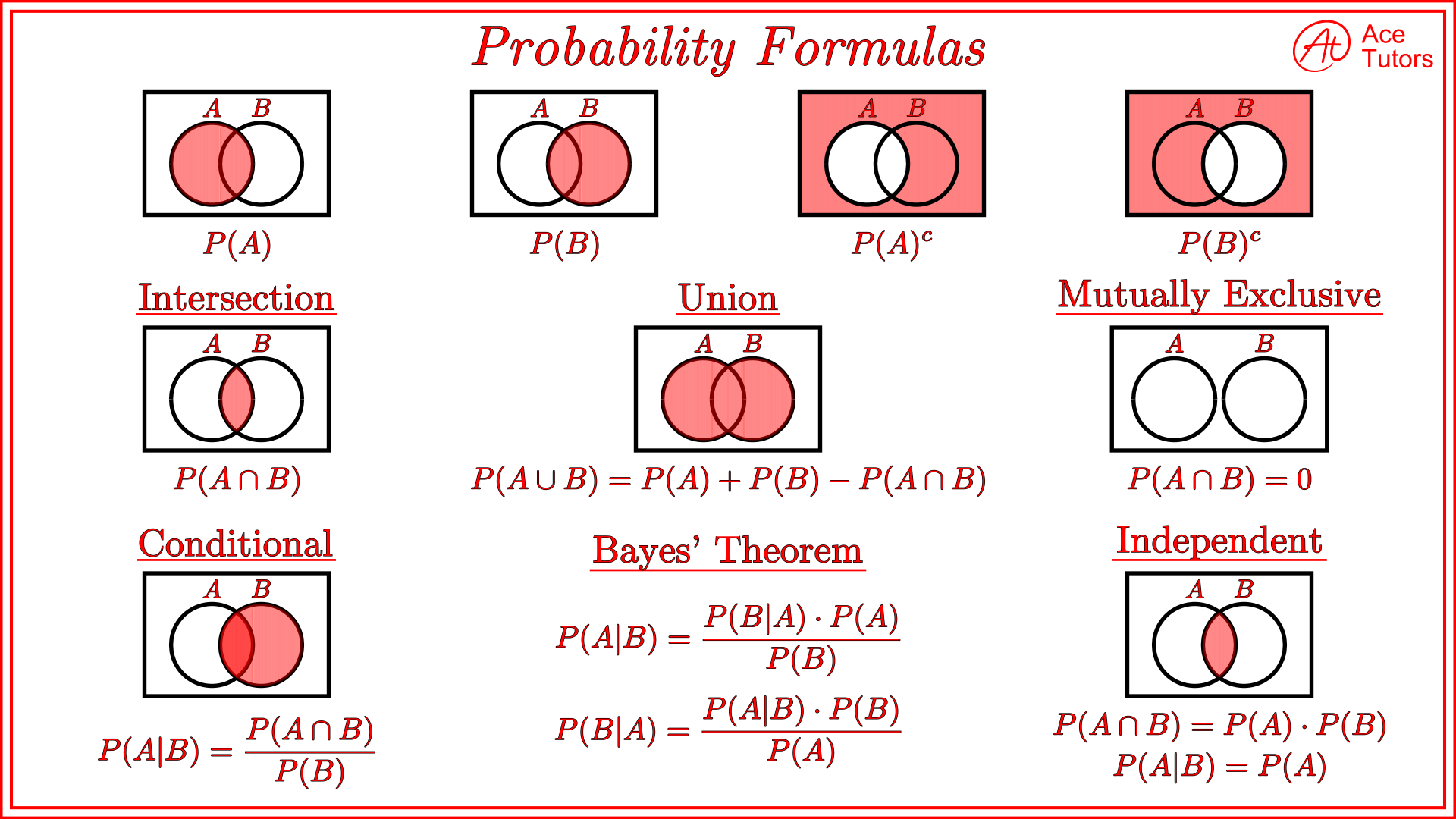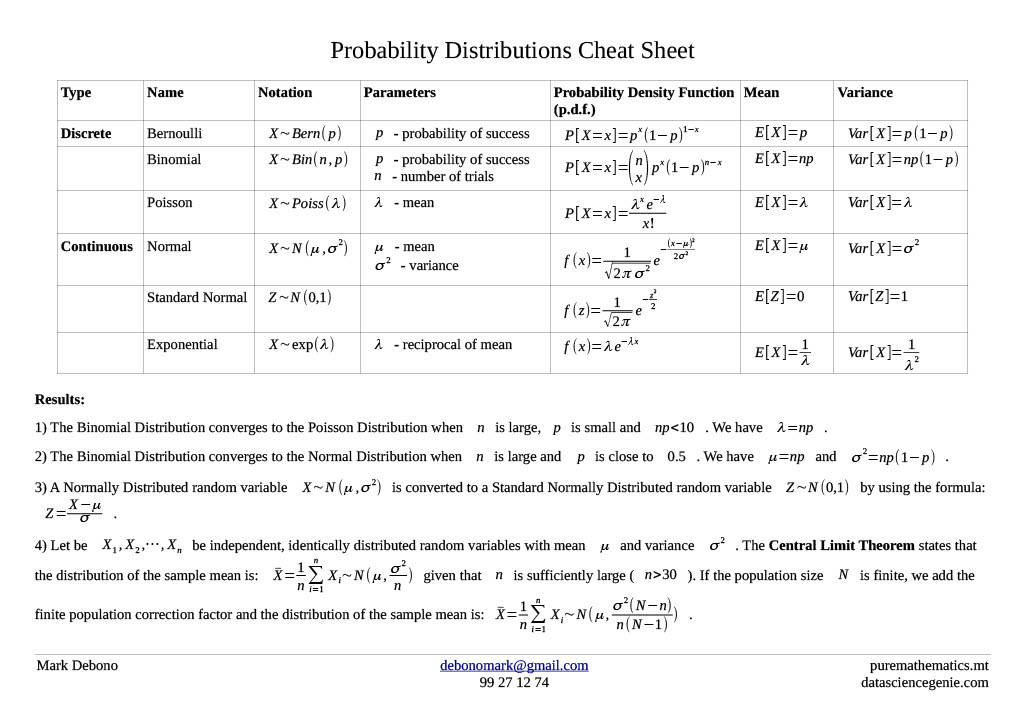Statistics And Probability Cheat Sheet - Our null hypothesis is that $y_i$ follows a binomial distribution with probability of success being $p_i$ for each bin. Material based on joe blitzstein’s (@stat110) lectures. This probability cheat sheet equips you with knowledge about the concept you can’t live without in the statistics world. \ [\boxed {0\leqslant p (e)\leqslant 1}\] axiom 2 ― the probability that. Probability is one of the fundamental statistics concepts used in data science. Statistics is a branch of mathematics that is responsible for collecting, analyzing, interpreting, and presenting numerical data. Axiom 1 ― every probability is between 0 and 1 included, i.e: We want to test whether modelling the problem as described above is reasonable given the data that we have. Axioms of probability for each event $e$, we denote $p (e)$ as the probability of event $e$ occurring. It encompasses a wide array of methods and techniques used to summarize and make sense.
Axiom 1 ― every probability is between 0 and 1 included, i.e: Probability is one of the fundamental statistics concepts used in data science. This probability cheat sheet equips you with knowledge about the concept you can’t live without in the statistics world. Material based on joe blitzstein’s (@stat110) lectures. \ [\boxed {0\leqslant p (e)\leqslant 1}\] axiom 2 ― the probability that. Axioms of probability for each event $e$, we denote $p (e)$ as the probability of event $e$ occurring. Statistics is a branch of mathematics that is responsible for collecting, analyzing, interpreting, and presenting numerical data. Our null hypothesis is that $y_i$ follows a binomial distribution with probability of success being $p_i$ for each bin. It encompasses a wide array of methods and techniques used to summarize and make sense. We want to test whether modelling the problem as described above is reasonable given the data that we have.
Statistics is a branch of mathematics that is responsible for collecting, analyzing, interpreting, and presenting numerical data. Axioms of probability for each event $e$, we denote $p (e)$ as the probability of event $e$ occurring. Axiom 1 ― every probability is between 0 and 1 included, i.e: \ [\boxed {0\leqslant p (e)\leqslant 1}\] axiom 2 ― the probability that. It encompasses a wide array of methods and techniques used to summarize and make sense. This probability cheat sheet equips you with knowledge about the concept you can’t live without in the statistics world. Our null hypothesis is that $y_i$ follows a binomial distribution with probability of success being $p_i$ for each bin. Probability is one of the fundamental statistics concepts used in data science. Material based on joe blitzstein’s (@stat110) lectures. We want to test whether modelling the problem as described above is reasonable given the data that we have.
Probability and Statistics Cheat Sheet Mathcentre Download Printable
Our null hypothesis is that $y_i$ follows a binomial distribution with probability of success being $p_i$ for each bin. This probability cheat sheet equips you with knowledge about the concept you can’t live without in the statistics world. Axioms of probability for each event $e$, we denote $p (e)$ as the probability of event $e$ occurring. Axiom 1 ― every.
Matthias Vallentin Probability and Statistics Cheat Sheet
\ [\boxed {0\leqslant p (e)\leqslant 1}\] axiom 2 ― the probability that. Axiom 1 ― every probability is between 0 and 1 included, i.e: We want to test whether modelling the problem as described above is reasonable given the data that we have. Statistics is a branch of mathematics that is responsible for collecting, analyzing, interpreting, and presenting numerical data..
Probability Symbols Cheat Sheet
This probability cheat sheet equips you with knowledge about the concept you can’t live without in the statistics world. Statistics is a branch of mathematics that is responsible for collecting, analyzing, interpreting, and presenting numerical data. Our null hypothesis is that $y_i$ follows a binomial distribution with probability of success being $p_i$ for each bin. We want to test whether.
Probabilities & Statistics Cheat Sheet GlobalSQA
\ [\boxed {0\leqslant p (e)\leqslant 1}\] axiom 2 ― the probability that. Probability is one of the fundamental statistics concepts used in data science. Statistics is a branch of mathematics that is responsible for collecting, analyzing, interpreting, and presenting numerical data. This probability cheat sheet equips you with knowledge about the concept you can’t live without in the statistics world..
Probability and Statistics Cheat Sheet Mathcentre Download Printable
Axiom 1 ― every probability is between 0 and 1 included, i.e: Axioms of probability for each event $e$, we denote $p (e)$ as the probability of event $e$ occurring. \ [\boxed {0\leqslant p (e)\leqslant 1}\] axiom 2 ― the probability that. Our null hypothesis is that $y_i$ follows a binomial distribution with probability of success being $p_i$ for each.
Probability and Statistics Cheat Sheet Mathcentre Download Printable
\ [\boxed {0\leqslant p (e)\leqslant 1}\] axiom 2 ― the probability that. Probability is one of the fundamental statistics concepts used in data science. It encompasses a wide array of methods and techniques used to summarize and make sense. Axiom 1 ― every probability is between 0 and 1 included, i.e: Statistics is a branch of mathematics that is responsible.
Probability Cheat sheet Cheat Sheet Probability and Statistics Docsity
We want to test whether modelling the problem as described above is reasonable given the data that we have. Axioms of probability for each event $e$, we denote $p (e)$ as the probability of event $e$ occurring. Statistics is a branch of mathematics that is responsible for collecting, analyzing, interpreting, and presenting numerical data. \ [\boxed {0\leqslant p (e)\leqslant 1}\].
Ap Stats Probability Cheat Sheet
Axioms of probability for each event $e$, we denote $p (e)$ as the probability of event $e$ occurring. We want to test whether modelling the problem as described above is reasonable given the data that we have. This probability cheat sheet equips you with knowledge about the concept you can’t live without in the statistics world. It encompasses a wide.
Probability Distribution Cheat Sheet puremathematics.mt
We want to test whether modelling the problem as described above is reasonable given the data that we have. Our null hypothesis is that $y_i$ follows a binomial distribution with probability of success being $p_i$ for each bin. Axioms of probability for each event $e$, we denote $p (e)$ as the probability of event $e$ occurring. Probability is one of.
Probability Rules Cheat Sheet. Basic probability rules with examples
Probability is one of the fundamental statistics concepts used in data science. It encompasses a wide array of methods and techniques used to summarize and make sense. Axioms of probability for each event $e$, we denote $p (e)$ as the probability of event $e$ occurring. We want to test whether modelling the problem as described above is reasonable given the.
Statistics Is A Branch Of Mathematics That Is Responsible For Collecting, Analyzing, Interpreting, And Presenting Numerical Data.
\ [\boxed {0\leqslant p (e)\leqslant 1}\] axiom 2 ― the probability that. It encompasses a wide array of methods and techniques used to summarize and make sense. This probability cheat sheet equips you with knowledge about the concept you can’t live without in the statistics world. Our null hypothesis is that $y_i$ follows a binomial distribution with probability of success being $p_i$ for each bin.
Probability Is One Of The Fundamental Statistics Concepts Used In Data Science.
Axiom 1 ― every probability is between 0 and 1 included, i.e: Material based on joe blitzstein’s (@stat110) lectures. Axioms of probability for each event $e$, we denote $p (e)$ as the probability of event $e$ occurring. We want to test whether modelling the problem as described above is reasonable given the data that we have.

